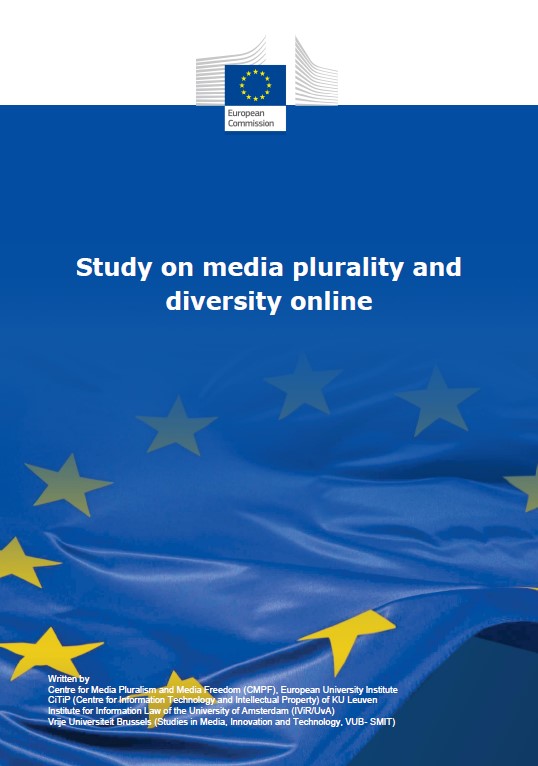On 16 September the European Commission published a study on media pluralism and diversity in an online environment.

Study on media plurality and diversity online – Final report
Study on media plurality and diversity online – Annexes
The study was written by researchers from four academic partners: The Centre for Information Technology and Intellectual Property of KU Leuven, the Institute for Information Law of the University of Amsterdam, and the Vrije Universiteit Brussels (Studies in Media, Innovation and Technology), under the leadership of the Centre of Media Pluralism and Media Freedom of the European University Institute.
The study investigates the value of safeguarding media pluralism and diversity online, focusing on (i) the prominence and discoverability of general interest content and services, and on (ii) market plurality and the concentration of economic resources. With a focus on Europe, the project was funded by a tender from the European Commission. The purpose of the assignment was to describe, analyse and evaluate the existing regulatory and business practices in the two areas mentioned above, and finally to elaborate some policy recommendations. Data were collected from the database of the Media Pluralism Monitor (CMPF) and through desk research, online consultations and interviews with stakeholders.
According to the authors, media pluralism is closely intertwined not only with the fulfilment of fundamental rights and the functioning of democratic societies, but also with healthy and resilient economies across the EU and the functioning of its internal market.
The study begins by highlighting the new definition of media used for the research, which distinguishes media actors from other actors in the media ecosystem which contribute to the functioning or accessing of media, but do not or should not exercise editorial control and are thus not to be considered media.
In addition, the study fulfilled two main objectives. In the first part, the authors aim to assess the extent to which European media are able to cater for pluralistic opinions and viewpoints online. The second part of the study focuses on market plurality and concentration of economic resources, with the aim of understanding the existence and effectiveness of measures regarding, for example, ownership transparency, capital controls, audience and market measurement, and media mergers in the EU Member States.
The researchers also carried out an assessment of the advertising-based business model for media in the digital era, and a scrutiny of alternative business models for journalism.
“This study breaks new ground in analysing the impact of the current distribution of advertising revenues as well as the ability to harness consumer data on media plurality. Our study confirms that the economic viability of the print and news media is disrupted, whereas online platforms could capture most of the revenues from digital ads.”
Dr Kristina Irion (IViR)
Finally, the study presents an overview and evaluation of the existing methodologies employed for measuring media plurality, ranging from the scope of measuring transparency, media power and market sustainability, to the possibility of accessing transparent and comparable data and eventually highlighting the scarcity and fragmentation of data across the EU.
Authors of the study:
For the Centre on Media Pluralism and Media Freedom (CMPF- EUI):
- Pier Luigi Parcu (Project Director)
- Elda Brogi (leader of Chapter B4)
- Sofia Verza (Project Coordinator)
- Danielle Da Costa Leite Borges
- Roberta Carlini
- Matteo Trevisan
CMPF external collaborators:
- Damian Tambini (leader A3)
- Eleonora Maria Mazzoli
- Beata Klimkiewicz
- Sally Broughton Micova
- Brankica Petković
- Maria Alessandra Rossi
- Maria Luisa Stasi
For CiTiP (Centre for Information Technology and Intellectual Property) of KU Leuven:
- Peggy Valcke (leader of Chapter A1 and A2)
- Ingrid Lambrecht
- With contributions of: Noémie Krack, Emine Ozge Yildirim
For the Institute for Information Law of the University of Amsterdam (IViR/UvA):
- Kristina Irion (leader of the Introductory Chapter and Chapter B2)
- Ronan Fahy
- Daphne Idiz
- Arlette Meiring
- Theresa Seipp
- Joost Poort
- With contributions of: Natali Helberger
For Vrije Universiteit Brussels (Studies in Media, Innovation and Technology, VUB- SMIT):
- Heritiana Ranaivoson (leader of Chapter B1 and B3)
- Adelaida Afilipoaie
- Nino Domazetovikj
- With contributions of: Tim Raats